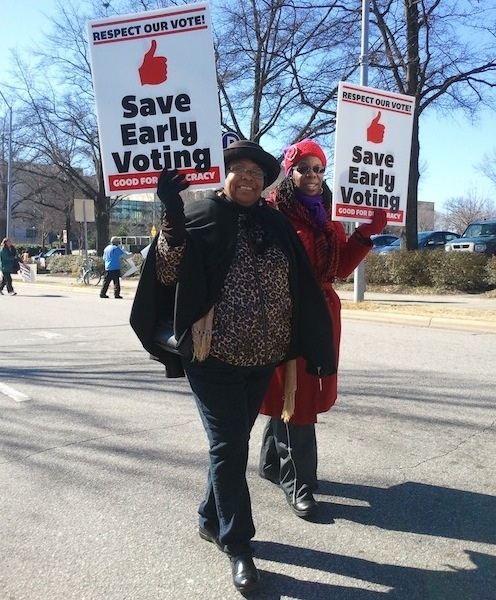More evidence of racial discrimination in NC 'monster' election law

Following last year's U.S. Supreme Court ruling in Shelby County v. Holder that blocked a key provision of the Voting Rights Act, North Carolina's Republican supermajority-controlled legislature passed the Voter Information Verification Act making broad changes to the state's election laws.
Among other things, VIVA requires a current photo ID for voters up to age 70 beginning in 2016. Beginning this year, it shortens the early-voting period and ends same-day registration during early voting; it already ended preregistration for youth ages 16 and 17. Voting rights advocates dubbed VIVA the "monster election law" and warned that it would make it harder for people -- and particularly people of color -- to vote.
Now there's more evidence -- scholarly evidence -- they were right.
A study by political science professors Michael C. Herron of Dartmouth College and Daniel A. Smith of the University of Florida using public data from North Carolina finds that VIVA will have a disproportionate effect on black voters in the state:
Specifically, we find that in presidential elections the state's black early voters have traditionally cast their ballots disproportionately often in the first week of early voting, a week eliminated by VIVA; that blacks disproportionately have registered to vote during North Carolina's early voting period and in the run-up to Election Day, something now prohibited by VIVA; that VIVA's photo identification provision falls disproportionately on registered blacks in North Carolina; that the special identification dispensation for North Carolina voters who are at least 70 years old disproportionately benefits white voters; and, that prior to the implementation of VIVA young blacks were disproportionately more likely than whites to avail themselves of the opportunity to preregister to vote.
Herron and Smith released a similar study in 2012 that found a Florida law cutting early voting would make it harder for the state's African-American and Hispanic citizens to vote. That study, titled "Souls to the Polls: Early Voting in Florida in the Shadow of House Bill 1355," was unanimously selected to receive the Best Paper Award for the State Politics & Policy Section of the American Political Science Association.
North Carolina's VIVA is being challenged by three separate federal lawsuits: from the U.S. Department of Justice, which says the law "would have the result of denying or abridging the right to vote on account of race, color, or membership in a language minority group"; from the state NAACP and others, who say it violates Section 2 of the Voting Rights Act and the 4th and 15th Amendments to the Constitution; and from the League of Women Voters and others, who also claim it violates the VRA.
However, the lawsuits aren't scheduled to go to trial until next year, while the next major election in North Carolina -- for a U.S. Senate seat and the entire state legislature -- takes place this year.
"Whether the various provisions in VIVA will affect voter registration and turnout remains to be seen," Herron and Smith write.
To read the paper, titled "Race, Shelby County, and the Voter Information Verification Act in North Carolina, click here.
Tags
Sue Sturgis
Sue is the former editorial director of Facing South and the Institute for Southern Studies.
